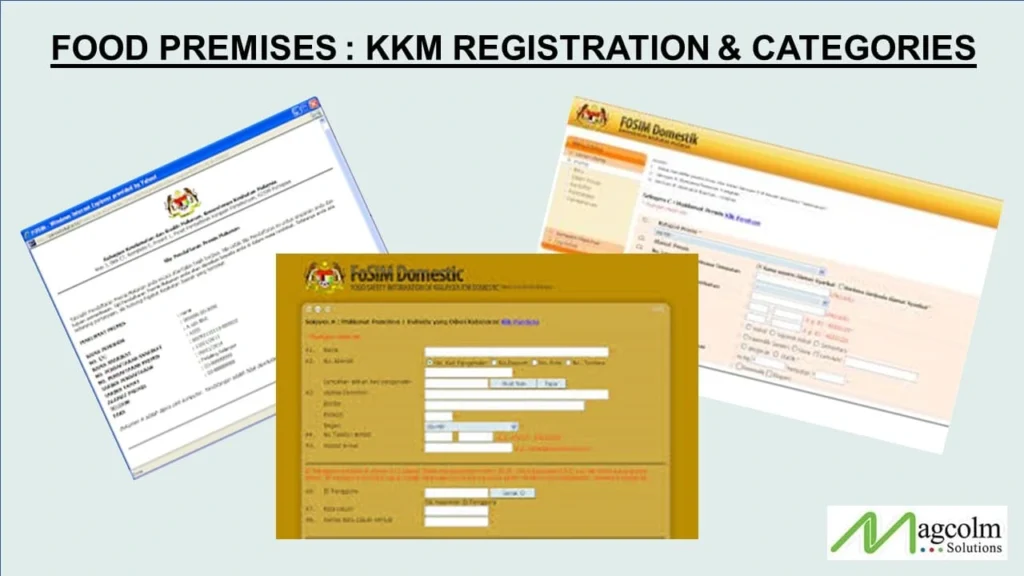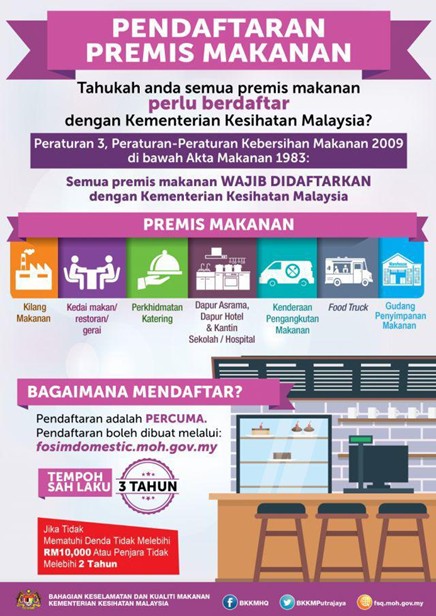- About
- Courses
-
- Advisory
-
-
💡 Build the Basics
- FSMS
- Home-Based
- BeSS
- MeSTI
- Halal IHCS
-
💡 Export Ready
- Food GMP
- HACCP
- VHM
- Halal Assurance System (HAS)
-
💡 Go Global
- ISO 22000
- FSSC 22000
-
💡 Others
- NPRA GMP & GDP
-
-
- Blog
- Contact Us
Food Hygiene Regulations Series
If you do not follow food hygiene regulations, you can get big fines. Your business might close. You could also have legal trouble if customers complain. Food hygiene and good hygiene help you avoid all these issues.
A food premises is any spot where food is made, kept or sold, including different types of premises. This could be your favorite kopitiam, a busy food truck, or a food vending machine. In the Food Hygiene Regulations 2009, it is important to say exactly what food premises are.
This makes sure all premises stick to safety standards and practice good food hygiene. By having clear rules, the food hygiene regulations help keep our food safe. This protects both sellers and people who eat at the premises.

So, why does the ministry of health put food premises into groups? The answer is clear. The ministry of health wants food premises to be safe for people. This is to make sure that every place dealing with food follows the rules. Food premises have to be clean and safe when they make or sell food. When the moh comes to check these premises, it lets people feel safe when they eat there.
Here’s how the MOH categorizes food premises:
Source : Food Hygiene Regulations 2009
Each food business has its own rules for keeping food safe. For example, a business that makes food has to follow rules for storing and packing the food. A restaurant needs to keep the kitchen and the eating area clean.
The Food Safety and Quality Division or FSQ, began the FoSIM project. FSQ wanted to help the food industry with this. It made a new app just for FSQ. The app gives everyone in the food industry one main place to talk and share.
They can use FoSIM for food safety standards through the web and also on their phones. This helps people work together on food safety standards.
FOSIM food premise registration is the process where food businesses sign up their site locations with FSQ under MOH. This is an official step that every business must take. The Food Hygiene Regulations 2009 requires this FOSIM system.
The food premise registration helps to plan, check, manage and watch over food premises. A lot of people use the FOSIM system to do these jobs. Anyone who needs to follow the Food Regulations, deal with food premise registration or work with MOH must use FOSIM for registration of their premises.
Before you begin to make and sell food, it is important to register your place with the people who are in charge. This step is needed so your spot meets the safety standards.
No registration? No service!
If you do not complete registration, you may have to pay fines. The place where you work could even have to close. Registration is when you give some details about the business. When you do this, you may need to share the address and the type of food business you are running.

Now, let’s talk about what can happen if you don’t follow this rule. You should know, it will not be good!
If you do not renew the registration for your premises, you might have to pay big fines. These fines can be as high as RM 10,000.00. The amount is a lot and can be hard on your wallet.
Imprisonment : For a term not exceeding two years.
To apply for premise registration for your food business with FoSIM, you can go to the official Fosim website at FOSIM. The registration process is easy. You need to make an account first. Then, fill out the forms and send the needed paperwork for your food business. Make sure all your information is right and that you follow all the guidelines. This will help your food premise registration go well and be done faster.
When you sign up your food premises, you do what the law tells you to do. You also help keep food safe and good for people. This helps all people in the industry. So, your premises also help make food better for everyone.
After you finish FOSIM registration, your business in the P1 group for food manufacturing needs to use a food safety assurance system. This system helps you do many important things. You have to keep good hygiene for the people working there. A good way to practice pest control is also needed. You must handle waste the right way. You need to keep the place layout and building in good condition. All these things come together to make food safe for everyone.
By using these steps for food safety, people who make food can keep the food production area safe. This helps people stay healthy. Makers also do what the rules ask. When you do these things, food production gets better. Customers trust what you make. Your business gets a good name.
These rules help to keep food safe at each step. Food has to be made, kept, and sold the right way. This keeps you, your family, and other people safe.
It helps every food business know what hygiene steps they need to take. This lets everyone follow the right safety rules.
Go to https://fosim.moh.gov.my/fssm/public/home .Do the steps that are shown on the site. You need to give all needed information about your business. Share where your business is and tell what kind of food you serve. That will help fosim and moh send your details to the right office.
You could get fines that go up to RM 10,000. You may also be put in jail for as long as 2 years.
It is a way to keep food safety good by making small changes all the time. People will get training, there will be regular checks, and the company will ask customers about their thoughts.
No, you can’t do that. If you run something without registration, it is not legal. You could get into trouble. You may face some big penalties for this.

People in the food business need to know about food hygiene regulations, hygiene, food handler training, how the registration process works, and all about registration. When you follow these food hygiene rules, your place is safer. It also helps your business stand out in a good way. You protect people and help your business feel trusted by them.
Also, having a Food Safety Assurance Program and certification can help your business stand out from others. This can make sure you meet safety standards and even do better than them. A safe food environment is good for the chef and the customer. Food safety helps everyone feel better about what they eat. So let’s work together to keep things safe and tasty for all!
At Magcolm Solutions, we’re here to help you set up a strong food safety assurance system for your business. Our dedicated sales team will guide you through the process and provide easy training and useful tools to ensure you meet all the health standards.
Let’s work together to create a safe space for your customers and staff. Contact us today to get started!

Meet Alicia Kho, the high-energy advisor who has been keeping industry standards flawless since 2010. When she isn’t making food safety simple and fun, she is busy being a proud mom of two or hunting for the perfect cup of coffee. She is always ready to help you grow—just keep the prawns away since she is strictly “prawn immune” thanks to a life-long allergy!